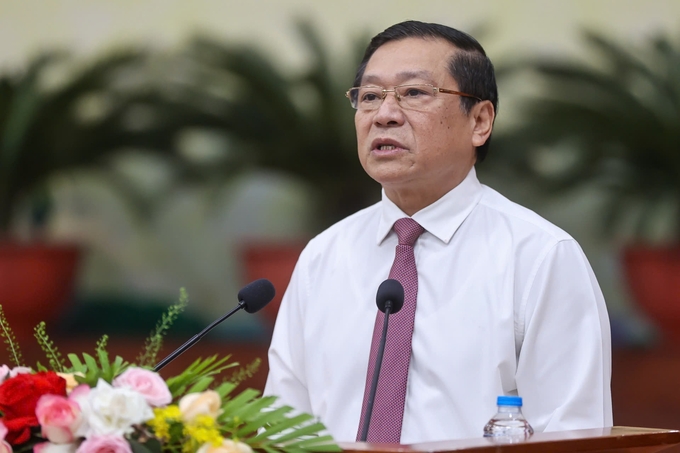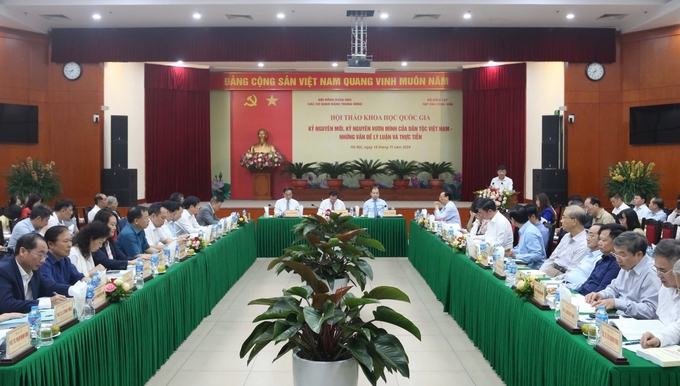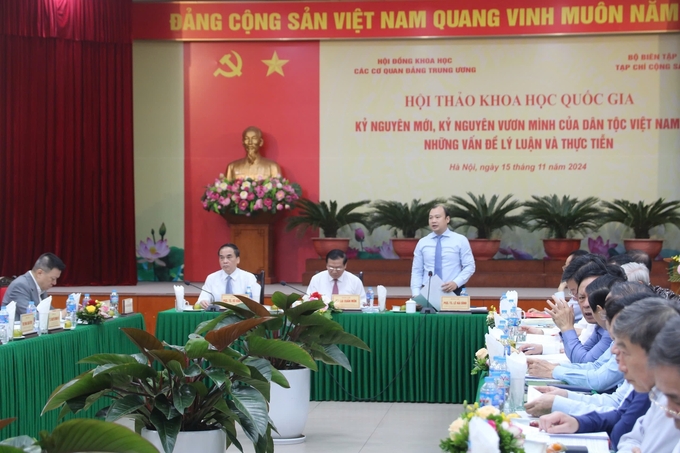May 17, 2025 | 22:29 GMT +7
May 17, 2025 | 22:29 GMT +7
Hotline: 0913.378.918
May 17, 2025 | 22:29 GMT +7
Hotline: 0913.378.918

Lai Xuan Mon, Member of the Party Central Committee, Standing Deputy Head of the Central Propaganda and Training Commission, and Chairman of the Scientific Council of Central Party Agencies, delivered the keynote speech at the conference.
The national scientific conference was organized by the Scientific Council of Central Party Agencies in collaboration with the Editorial Department of the Communist Review.
In his keynote address, Dr. Lai Xuan Mon emphasized that General Secretary To Lam, in his recent writings and significant speeches, has highlighted the concept of a "new era, the era of Vietnam's rise." This vision, affirmed at the 10th Plenum of the 13th Party Central Committee, represents a new strategic direction for national development with profound political significance. Consequently, stakeholders are recommended to incorporate this vision into the documents of the 14th National Party Congress, ensuring thorough dissemination and implementation with high political resolve across the Party, people, and armed forces.
However, this is a significant and novel topic in both theoretical and practical terms, requiring in-depth research and analysis to achieve a unified understanding and develop a detailed action plan. The current conference marks the first discussion on this pivotal issue, laying the groundwork for further exploration to clarify and strengthen the theoretical and practical foundations of this new era of Vietnam’s rise.
A new era typically marks the beginning of a transformative period associated with a major event that significantly impacts subsequent development phases, whether in a specific field, community, or nation.
In Vietnam, the founding of the Communist Party in 1930 led to the historic victory of the August Revolution in 1945, ushering in the Ho Chi Minh era of independence and freedom. From 1945 to 1975, the Party, people, and armed forces focused on achieving two major objectives of the first revolutionary era: securing independence and freedom for the nation and laying the initial groundwork for the second era.
With national reunification in 1975, the country began on a path towards socialism, setting a firm foundation for the 1986 6th Party Congress to launch the *Doi Moi* (Renewal) policy, initiating the second era—marked by unity and reform.
Over nearly 40 years of *Doi Moi*, Vietnam has achieved substantial and historically significant progress. The core objectives of the era of unity and reform have been largely fulfilled, enabling the nation to transition into the third era—an era of national rise, prosperity, and happiness.
The vision of entering a “new era of Vietnam’s rise” is compatible with the trajectory of the Vietnamese revolution and the global development trend. By the time of the 14th Party Congress, Vietnam’s achievements in terms of resources, potential, international standing, and credibility will necessitate a breakthrough in development, accelerating the nation’s sustainable progress.
The current global context is marked by rapid and fundamental transformations, presenting both unprecedented challenges and opportunities. The Fourth Industrial Revolution, with its groundbreaking achievements, has created unique prospects for nations capable of utilizing its potential to achieve extraordinary progress. With this opportunity in mind, the Party is actively pursuing strategies to harness these advantages, which are the key to Vietnam’s breakthrough and accelerated development.
This development marks a historic juncture in Vietnam’s journey, as the country enters a new era of national growth and rising prominence. Accordingly, Vietnam's leap into this era, beginning with the 14th Party Congress, reflects the objective law of its revolutionary trajectory and contemporary trends. Experts and scholars have been requested to further explore and substantiate this significant development.

The national scientific conference "A new era of Vietnam's rise – Theoretical and practical issues."
During the conference, Chairman Lai Xuan Mon posed a central question: "What defines the essence of this new era of Vietnam’s rise, and what pillars will Vietnam build this era on?"
He suggested that the new era represents a time of comprehensive and coordinated breakthroughs in Vietnam’s development across all fields. It envisions the country, society, and its people advancing to new heights of progress, modernity, and civilization, realizing the goals of building a peaceful, independent, democratic, prosperous, and happy Vietnam. Furthermore, the country will remain determined on its path to socialism, and making meaningful contributions to global peace, progress, and prosperity.
This era is anchored in the achievements of the Fourth Industrial Revolution, promoting significant and synchronized growth across key areas. Accordingly, the Chairman highlighted several major development pillars:
1. A modern, socialist-oriented market economy: a high-performing, globally integrated, and modern market economy that relies on a digital production force as well as digital production relations. This economy will feature a rational structure, synchronized and advanced infrastructure, and sustainable, in-depth growth. It will utilize high-quality human resources, modern science and technology, innovation, digital transformation, and green transformation. The model prioritizes new production and trading methods tailored to the Fourth Industrial Revolution, thereby achieving high productivity, efficiency, and global competitiveness while effectively integrating into global production networks and value chains.
2. A democratic, equitable, and civilized society: A society characterized by harmony, sustainability, and modern governance built on a digital society. Its foundation lies in transparency, public consensus, and direct, consistent interaction between the government, businesses, citizens, and social groups. The core principles, “The people are the roots,” “The people are the center,” and “The people are the owners,” define this social framework.
3. A united and culturally rich nation: A Vietnam that is united, resilient, confident, self-reliant, and filled with national pride. The nation’s cultural identity will be a culmination of traditional values, the achievements of its heroic history, and global cultural advancements. Vietnamese citizens will be well-rounded individuals, patriotic, innovative, and driven by aspirations to contribute to the country’s prosperity. Strengthening internal resources and Vietnam’s cultural soft power will be crucial.
4. A strong, modern defense and security system: Vietnam aims to maintain a strong defense and security apparatus, complemented by high-level diplomacy. Maintaining peace, stability, and sovereignty in all scenarios is a priority. The nation also aims to enhance its international standing and prestige, with goal of embodying a powerful, peaceful, and friendly Vietnam.
5. An efficient, streamlined political system: The political system must be cohesive, unified, effective, and efficient. Central to this is a socialist rule-of-law state, with improved legislative, executive, and judicial quality. The system will emphasize socialist democracy, the rule of law, and a focus on digital governance, digital society, and a digital economy.
The Party will maintain its leadership role in effectively guiding Vietnam’s political system and its society. Additionally, reforms are necessary to ensure its political, ideological, organizational, and ethical strength. Enhancing the Party’s strategic vision, policymaking capability, and capacity to seize and create opportunities for sustainable national development will remain a crucial task.
As Vietnam steps into this new era of rise, these pillars will provide the framework for achieving sustainable, breakthrough growth while complementing the trajectory of the Vietnamese revolution and the global trend of progress.

Associate Professor Dr. Le Hai Binh, Alternate Member of the Party Central Committee and Editor-in-Chief of the Communist Review, delivering a speech at the conference.
Chairman Lai Xuan Mon, member of the Party Central Committee and Chairman of the Scientific Council of Central Party Agencies, outlined six key topics requiring in-depth analysis and discussion:
1. Theoretical and ideological efforts must adopt new approaches that build on past successes while embracing innovation and global developmental trends. Chairman Mon emphasized that bold and forward-thinking innovation is a critical starting point for breakthroughs.
2. Developing and effectively implementing a modern institutional framework is vital for the new era. This includes eliminating barriers and addressing bottlenecks that prevent progress, particularly in the execution of Party resolutions, directives, and regulations. Key solutions include: Promoting science, technology, innovation, and high-quality human resources; Accelerating digital and green transformations; Developing modern, integrated infrastructure, especially in digital technology, transportation, and renewable energy. These efforts aim to create an enabling environment for innovative business and production models aligned with the Fourth Industrial Revolution.
3. The Party’s leadership approach must be adjusted to meet the demands of this transformative period. This includes streamlining organizational structures within Party agencies, government bodies, and socio-political organizations to enhance efficiency and effectiveness. Additionally, the Party should focus on cultivating a cadre of leaders and managers—especially at strategic levels—who are competent, ethical, and visionary, capable of guiding the nation through this pivotal era.
4. As emphasized by General Secretary To Lam, the Party must lead through policy and institutionalize its directives into state law to manage society in an effective manner. Special mechanisms are necessary to ensure that policies and laws reflect the will of the people, protect state interests, and protect legitimate individual and organizational rights. Flexibility in policy responses and timely problem-solving will be critical to maintaining national and social interests.
5. General Secretary To Lam has called for a digital revolution to restructure production relations and establish a new, advanced production method—*digital production*. This requires clarity on the relationship between digital production, the knowledge economy, and socialist production methods. These theoretical foundations are essential for navigating this transformation effectively.
6. The fight against waste must be as vigorous and comprehensive as efforts against corruption and negativity. This is essential for mobilizing resources to improve the people’s welfare and drive national prosperity. The interrelationship between anti-corruption and anti-waste measures, along with comprehensive solutions, must be clearly defined to ensure substantial progress.
Chairman Mon expressed confidence that the insights and recommendations discussed at the conference will provide a strong scientific foundation for clarifying theoretical and practical issues related to Vietnam’s new era. These contributions will play a critical role in shaping the content of the 14th National Party Congress's key documents, guiding the nation toward a prosperous and sustainable future.
Translated by Nguyen Hai Long

(VAN) The United Nations designated 22 May as the International Day for Biodiversity 2025 with the theme 'Harmony with nature and sustainable development.'
![Multi-channel, multi-directional Vietnamese agricultural markets: [8] A national strategy is needed](https://t.ex-cdn.com/nongnghiepmoitruong.vn/608w/files/phucpm/2025/05/15/1435-thi-truong-nong-san-viet-da-kenh-da-huongbai-8-can-mot-chien-luoc-quoc-gia-084750_728.jpg)
(VAN) The Chairman of Hung Nhon Group shared: ‘Opening up and tapping into new markets is the right and strategic direction for Vietnam's agricultural sector.’

(VAN) Food waste has become a serious issue in modern society, especially in rapidly urbanizing and developing cities like Hanoi.
![Multi-channel, multi-directional Vietnamese agricultural markets: [7] Deep processing makes global reach easy](https://t.ex-cdn.com/nongnghiepmoitruong.vn/608w/files/huytd/2025/05/16/2946-che-bien-sau-chia-khoa-vang-nang-tam-nong-san-viet-tren-ban-do-the-gioi-080603_110-093858.jpg)
(VAN) The application of deep processing technology is helping Vietnamese agricultural products enhance their value, create competitive advantages, and open doors to conquer global consumers.
![Multi-channel, multi-directional Vietnamese agricultural markets: [6] Agri products go online](https://t.ex-cdn.com/nongnghiepmoitruong.vn/608w/files/content/2024/12/10/1-113313_954.jpg)
(VAN) Bringing agri products onto e-commerce platforms is an effective way to build a brand that many businesses, cooperatives, and agricultural production households are doing.

(VAN) Veterinary training should focus on quality, not just quantity. Veterinarians also need more options to pursue specialized training.

(VAN) The veterinary industry needs to be viewed objectively and further invested in to properly demonstrate its role and importance in the new context.